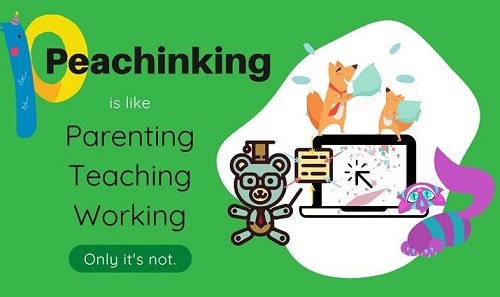
You've been trying to act professionally during the Zoom call, being oh so grateful to blur the background and not show the horror of unwashed dishes, drying washing and the cat's latest present from the outside world, dead and gutted on the windowsill.
'Sure, I'll have that proposal for you tomorrow morning.'
You groan, knowing a night of no sleep lies ahead, and turn to help the 10-year-old find her Google Meet link to join the Maths class. Peachinking is a mish-mash of parenting, teaching and working; only, it's not.
- Is Natural Learning the key to keeping young minds sharp during lockdown?
- Managing matric in a time of turmoil
- OPINION | Corona, trauma, school and the future: Where to from here?
What is Peachinking?
When we're not in lockdown, our roles are often more demarcated. We know when we are parents, when we leave to become providers or when we care for our elderly parents or those we love.
Most often, we leave our children's education to trained experts, those magnificently blessed, halo-wearing, angel-winged superheroes that float through school corridors. (Remember how great it felt to smile and wave as you walked away and left your kids in their care?)
These roles are defined by spaces and times, by us going somewhere or leaving, by contexts and people.
During lockdown this has, of course, all changed. We've seen first-hand what our children do in class each and every day. We saw the first few days of frustration with getting the tech to work.
Thank goodness these made way for them knowing their way around Meets and Hangouts, and Group chats.
Our kids have learnt to use Voice-to-Text to type, watched hours of their teachers' presentations and have completed worksheets and assignments.
Going anywhere means walking a few steps.
They're so over it. Everyone's so over it. How can this possibly be made easier, you ask? Is there hope?
So how can we make the most of Peachinking?
All is not doomed. Quite the opposite. Peachinking is, as Aristotle said, "The whole is greater than the sum of its parts."
We can take positive and healthy steps to make peachinking work as the next few weeks or possibly still months of lockdown and isolation remain in place.
By following some basic steps and implementing a few fun and easy activities, the whole family can benefit from this very unusual time.
The hardware and the software
In our world, distance learning and online learning are two different things. I say this to help parents understand that most teachers have had to crisis-manage.
What they've been doing the past few weeks and months has been done on the fly, late at night and after their own children have gone to bed. Did you see the teachers face when his dog let off that almighty gas explosion?
The kids almost fell off their chairs and the toddler screamed with laughter. If recordings sound echoey, it's probably because the only quiet room is the bathroom. Why raise this point?
It's important to note that teachers take exceptional pride in their professionalism. Under normal circumstances, every lesson and every learning task is carefully structured and chosen to build one on the other.
Teachers introduce topics like rungs on a ladder. As your child learns to climb each step of the ladder, they introduce even more difficult tasks and concepts to make them climb a little higher.
By the end of a unit, your child has climbed the entire ladder. This is what we call scaffolding, and it's something teachers do every day.Teaching during lockdown has looked very different.
Teachers have used 'hardware' and 'software' in online and offline ways. They've taught with books and pens, or computers - let's call all of this hardware, or they've used online tools and digital resources, or worksheets and packets of resources which we'll call software.
They've had little or no way to gauge where learners are on the ladder so scaffolding could not adapt to the individual needs of learners. Normally teachers would gauge where learners are at and then adapt their lessons to scaffold the learning tasks.
Now, this is less possible, so learning is generally more generic. Possibly more video-watching and worksheet completion, and perhaps less differentiated than would normally happen.
What can you do?
Don't take this to be the norm. This isn't what happens in classrooms. If your child gets frustrated, help them focus on what they can do. If they get overwhelmed, focus on ONE task, ONE thing at a time.
Do what makes sense and what you and your children love and understand. If it causes tears, stop. If it tears to manipulate you to stop, that's a different story and address that.
But if the hardware and software causes the tears, take it easy. When they're back at school, their learning will once again be scaffolded. They'll once again be guided up their ladders, and you'll be off the hook.
Till then, make every moment of learning at home as joy-filled and happy as you can. Pick your battles without being a pushover.
Always remember that teachers can fix a lot, but the hardest things to fix are hatred of learning and a broken spirit.
Carve out space and time
Learning ALWAYS happens in a particular space and place, and most likely at a particular time. Where and when we learn is important.
If where we learn and when we learn, is no different from where we play and relax or where we eat and sleep, then learning is not segregated as a distinct activity.
A clearly demarcated space and time helps everyone know that learning has started, and when it ends. This helps you plan your day and structure when you can block out work-time.
If you have a room for learning or a space where it can happen, use this. If you don't have this space, use a special blanket or chair that they can sit on when they learn.
Create a special ritual that starts the learning session. Get the kids to dress in specific clothes before school or let THEM set the timer and write their times in a prominent place for when their learning starts and ends.
A wonderful tool to use is the Pomodoro Method - Google it! They only have to focus for 25 minutes at a time. It helps them chunk their learning time.
The learning
Our children have different learning preferences. Some children prefer learning while they move; others like to learn by listening while others prefer to read visual texts and images.
Others prefer learning through music. Your child's teachers could probably tell you quite easily what their learning preferences are. In the past few weeks, they've probably had an overdose of watching videos and completing worksheets. Perhaps you drew a chalk obstacle course outside and it worked quite well?
The kids loved it, but after the toddler ate the chalk and the kids screamed at the dog for pooping on the bunny hops, you haven't tried this again?Everyone, including our children, needs balance in their lives.
Sitting still and watching a screen all day is never ideal. We need to keep their little minds active and stimulated to create and make, invent, take risks and experiment within safe, secure boundaries.
As much as possible, create opportunities for this. Challenge each other to create at least one invention a day. It can be anything, from something to eat to a thought experiment.
Share it over dinner, but put the challenge out there.
Build and Show Resilience
A gratitude diary is a wonderful way to get everyone in the family-focused on the positive. Everyone can be part of it. It can take 5 - 10 minutes every other day to write.
You can keep a traditional diary or let everyone write what they are grateful for on notes that they put in a jar, then open it once a week to share with each other. Your jar can become your lockdown time capsule that you keep for years to come.
Here are some tips for keeping a Gratitude Diary:
1. Be as specific as possible.
2. Be detailed about a particular person or thing.
3. Think of things you are grateful for being in your life, and for NOT being in your life.
4. Good things are 'gifts' to bank for hard days. Relish and savour these for those days.
5. Don't overdo this – only write a maximum of 3 times a week.
Reach across distances
We're all in this together. Some realize this more than others. Some of us love the solitude and isolation and are pretty comfortable without rushing to school pick-ups and soccer practices, rehearsals and meetings in between work commitments.
Others are going stir crazy in the absence of people.
They need people to get their energy fixes. Here's a thought: let the kids make gratitude bouquets or send happy cards on phones or computers to family and friends who they miss.
Set up cooking challenges on Hangouts or Zoom. Have a family Game night or music quiz on Skype. Use the 'office' tools to reach across the distances.
May your lockdown be as peachy as the Peachinking heroes you are!
This article was originally published on Limina.co.za and has been republished here with kind permission from Dr Isabel Tarling.
Dr Isabel Tarling is a mom of three, who, after teaching in both primary and secondary schools for over ten years, developed an interest in helping teachers teach.
Chat back:
Share your story with Parent24. Anonymous contributions are welcome.
WhatsApp: Send messages and voicenotes to 066 010 0325
Email: Share your story with us via email at chatback @ parent24.com




 Publications
Publications
 Partners
Partners

















